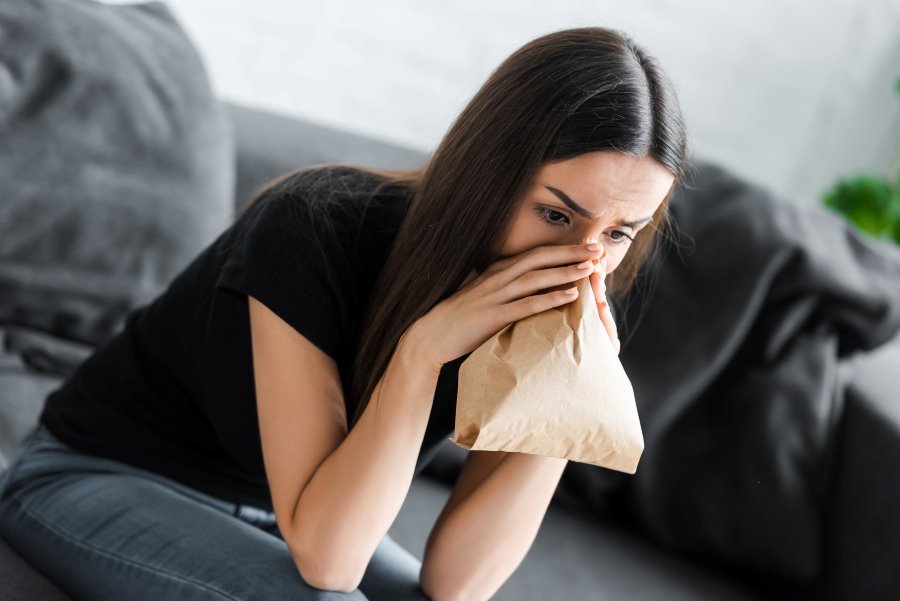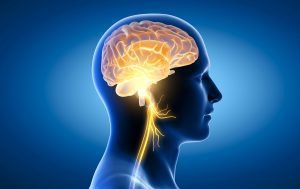Are you having trouble finding the root cause of your anxiety or panic attacks? I have a list of potential causes below that I’m hoping you’ll find helpful.
1. Nutritional Deficiencies
Nutritional deficiencies such as low vitamin B12, iron/ferritin, calcium, potassium, and/or magnesium can cause anxiety and panic attacks. To find out more about these nutritional deficiencies, see our “5 Nutritional Deficiencies That Cause Anxiety” post.
I believe in “testing and not guessing” since deficiency symptoms can overlap and you might not be able to tell what is really going on. In addition, if you get blood work done, compare your results to the optimal ranges that a naturopath or integrative/functional medicine practitioner would use. For many people, symptoms can occur whenever their blood work results are within the standard range, but outside the optimal range. This was the case with my ferritin results. They were within the standard range yet I could barely walk up a small hill due to shortness of breath caused by lower-than-optimal ferritin levels in my blood.
When testing magnesium, a Magnesium RBC test is preferable to a blood serum magnesium test.
According to Dr. Carolyn Dean, author of The Magnesium Miracle:
“Serum magnesium is a very inaccurate measurement of magnesium in the body. Magnesium in the blood stream, AKA serum magnesium, measures only 1% of the total body magnesium; the range is 1.8-3.6mg/dL. When serum magnesium drops, mechanisms in the body push the levels up by dragging magnesium out of the bones and muscles. This is done for a very important reason – the heart muscle requires a constant level of magnesium or it will go into spasm – AKA a heart attack!”
She also adds that you want your Magnesium RBC test results to be in the optimal range of 6.0-6.5 mg/dL (units outside the U.S. might be different).
2. Gut Infections
Various gut infections, such as H. pylori and parasite infections, can cause anxiety. These infections can lead to nutritional deficiencies which in turn can cause anxiety and panic attacks.
One of the best gut health tests is the GI-MAP stool test; however, it’s quite expensive and you have to find someone who can order it for you or at least knows how to interpret the results. If you can’t afford the GI-MAP test, look for a cheaper option through a medical practitioner that will tell you if you have an imbalance of gut bacteria and a parasite infection.
If you just want to find out whether you have an H. pylori infection, you might be able to get a stool, blood, or breath test ordered by a medical doctor.
3. Histamine Intolerance
Histamine intolerance occurs when there is a buildup of histamine in the body. One of the symptoms of histamine intolerance can be anxiety. Unfortunately, this is something I’m very familiar with. I can be fine for days and then one day I get a rash on my hands and/or face and anxiety kicks in.
Some of the symptoms of histamine intolerance include:
- Anxiety
- Dizziness
- Hives
- Rashes/eczema
- Diarrhea
- Asthma
- Runny nose
- Headaches or migraines
- Low blood pressure
- Chronic fatigue
- Nasal congestion
- Irregular menstrual cycle
- Digestive issues
- Itchy eyes
- Tissue swelling
- Panic attack
- Elevated pulse
Foods high in histamine that can cause the above symptoms include:
- Fermented foods (sauerkraut, yogurt, pickles, kimchi, etc.)
- Alcohol
- Kombucha
- Avocado
- Spinach
- Processed meat
- Aged cheese
- Shellfish
- Fish and meat that isn’t very fresh
Sauerkraut, yogurt, and pickles were the three foods that made me realize that I was dealing with histamine intolerance. They’re so high in histamines that they give me problems every time I eat them.
There are also foods that trigger histamine release in the body:
- Bananas
- Tomatoes
- Chocolate
- Alcohol
- Citrus fruit
- Some nuts
One of the best ways to determine whether you suffer from histamine intolerance is to try a low-histamine diet, or at least keep a food diary and take note of when symptoms occur. If you decide to remove a lot of foods from your diet, it might be a good idea to consult with a dietician to avoid nutritional deficiencies.
Some of the things I take to lessen my symptoms include quercetin, higher doses of vitamin C, special probiotics that lower histamine, and nettle leaf tea or capsules. Depending on where you live, you might be able to also find a diamine oxidase (DAO) supplement. DAO is an enzyme responsible for the degradation of ingested histamine. The DAO supplement I’ve tried is called “Histamine Block” by Seeking Health.
Since histamine intolerance can be caused by gut dysbiosis (an imbalance of bacteria in your gastrointestinal tract), it’s important to work on your gut health to improve or completely cure your histamine intolerance.
4. Hormonal Imbalance
Is your TSH (thyroid-stimulating hormone) too high or too low? Do you have low T4 (thyroxine), low T3 (triiodothyronine), or low progesterone (if you’re a woman)? If not within the optimal range, all of these hormonal imbalances can cause anxiety.
If you’re a woman, I highly recommend reading Dr. Sarah Gottfried’s blog posts on the topic of sex hormones. She also wrote a book called The Hormone Cure which can help you balance your hormones. Other great information sources for women’s hormone health that I recommend include Hormones Balance, Flo Living, and Dr. Jolene Brighten’s website.
If you’re a man, make sure to get your testosterone levels checked the next time you’re going in for blood work as low testosterone can cause anxiety and depression. If your levels are low, there are some dietary and lifestyle changes you can try in order to increase it.
To check your thyroid hormones, ask for a complete thyroid panel. Unfortunately, your doctor might only test your TSH which will not show the complete picture of what’s really going on with your thyroid.
My TSH results were always within a good range; however, my T3 was less than optimal and at the low end of the standard range. I wasn’t able to get my T3 tested until I saw an integrative medicine practitioner since T3 levels aren’t normally tested where I live.
Depending on where you live, you might be able to order a test online if your doctor refuses to order complete thyroid blood work.
5. Food Intolerances/Sensitivities
Food intolerance is a digestive system response. It occurs when a person has trouble digesting certain foods. Food sensitivities are quite common and they can cause the following symptoms:
- Bloating
- Stomach pain
- Nausea
- Heartburn
- Headache
- Vomiting
- Gas
- Cramps
- Skin rash
- Irritability
- Nervousness
- Diarrhea
- Runny nose
- Flushing of the skin
- Anxiety
The foods people react to most frequently include:
- Dairy
- Gluten
- Sugar
- Corn
- Soy
- Peanuts
- Nuts
- Eggs
- Nightshades (tomatoes, potatoes, eggplants, etc.)
If you seem to have many food sensitivities, it’s important to work on your gut health as increased intestinal permeability, also known as “leaky gut”, and gut dysbiosis could be the root causes. Find a good health practitioner who knows how to heal leaky gut and gut dysbiosis if you don’t know where to start. Make sure to get a good stool test done in order to rule out gut infections since those can cause leaky gut.
6. Chronic Stress
As you probably have heard before, frequent and long-term stress can have a huge impact on your mental and physical health. One of the things chronic stress can cause is digestive issues. If your digestion isn’t working well you will end up with nutritional deficiencies (see #1 above). Also, if you’re like me, you might crave more unhealthy foods like processed carbs when you’re stressed out. You then end up eating those low-nutrient-density foods that fuel your anxiety.
Chronic or unmanaged stress can also affect your hormones. If you’re a woman and your cortisol is frequently high, you’ll end up with low progesterone levels because of something called “pregnenolone steal”. Pregnenolone is a precursor for most of the steroid hormones and when you’re stressed out the pregnenolone will be used to make cortisol instead of progesterone. As your progesterone levels go down, you’re more likely to feel anxious.
If you’re a man under chronic stress, your pregnenolone will be used to make cortisol instead of testosterone, and as I’ve mentioned in #4 above, low testosterone can be responsible for anxiety and depression.
In addition, according to Dr. Sara Gottfried:
“When you’re highly stressed, the chemical load is more than you can bear, and you lose homeostasis. Your balance between the sympathetic nervous system and the parasympathetic nervous system falls out of whack. Chronic stress overactivates the sympathetic nervous system and underactivates the parasympathetic nervous system. You also make less GABA, nature’s benzodiazepine.
GABA is short for gamma-aminobutyric acid. It is the calming or ‘downer’ (inhibitory) neurotransmitter that counters the effect of glutamate and creates calmness, like nature’s Xanax. GABA and glutamate act in a complementary fashion.
If GABA is too low: you feel overstimulated; panic, depression, anxiety, insomnia, PTSD, premenstrual syndrome (PMS), addiction (especially alcohol cravings).”
Try to manage your stress by practicing yoga, meditation, eating real food, journaling, walking in nature, mindfulness, getting a massage, and/or by going to therapy.








